2021 年湖北省荆州市中考英语真题及答案
注意事项:
1.本试卷有九大题,共 8 页。全卷满分 120 分,考试时间 100 分钟。
2.所有题目必须在答题卡上答题,在试卷上答题无效。选择题在答题卡上用 2B 铅笔将各题号下相应的矩
形框“ ”涂黑;非选择题在答题卡上相应题号后的空白处用黑色签字笔或黑色墨水钢笔答题。
★祝考试顺利★
【听力测试】(25 分)
Ⅰ. 对话理解。(共 15 分,每小题 1 分)
听对话,根据你听到的内容从每小题的三个选项中选出一个正确选项。每段对话听两遍。
听第 1 段对话,回答第 1 小题。
1. What’s the weather like these days?
A. Warm.
B. Cold.
C. Hot.
听第 2 段对话,回答第 2、3 两个小题。
2. How much is the pen?
A. Five dollars.
B. Seven dollars.
C. Ten dollars.
3. What does the man think of the pen?
A. Expensive.
B. Very cheap.
听第 3 段对话,回答第 4、5 两个小题。
4. Who won the 100-meter race?
C. A little shorter.
A. Wang Hai.
B. Zhang Jun.
C. Liu Dong.
5. What happened to Liu Dong in the high jump?
B. He hurt his knee.
A. He ran too slowly.
听第 4 段对话,回答第 6 至 8 三个小题。
6. How long did Kate do her homework?
C. He met his teacher.
A. For one hour.
B. For two hours.
C. For three hours.
7. Why do Kate’s parents want her to study all day?
A. Because they expect her to get good grades.
B. Because they want her to go to a good university.
C. Because they think students should always study hard.
8. What will Kate do after talking with Peter?
A. Do homework with Peter.
B. Have a talk with her parents.
C. Spend more time on study.
听第 5 段对话,回答第 9 至 11 三个小题。
9. Where is Sally?
A. In the classroom.
B. In Betty’s home.
C. In a shop.
10. Whose birthday is next Friday?
A. Dave and Sally’s.
B. Dave and Betty’s.
C. Sally and Betty’s.
11. When is the birthday party next Friday?
A. At six o’clock.
B. At half past six.
C. At seven o’clock.
听第 6 段对话,回答第 12 至 15 四个小题。
12. What are the two speakers doing?
A. They are waiting for a bus.
B. They are seeing a doctor.
�
C. They are making a call.
13. Who’s ill in hospital?
A. Li Lei’s aunt.
B. Ann’s aunt.
C. Li Lei’s uncle.
14. How far is the hospital from Ann’s home?
A. About sixteen kilometers.
B. About sixty kilometers.
C. About six kilometers.
15. Where is the bus stop?
A. Across from the park.
Center Hospital.
Ⅱ. 短文理解。(共 10 分,每小题 2 分)
B. Opposite Li Lei’s home.
C. Near the
听下面一段短文, 从每小题的三个选项中选出一个正确选项。短文听两遍。
16. When will Cindy go to senior high school?
A. In July.
B. In August.
C. In September.
17. Why is Cindy a little worried?
A. She only has five minutes to get to the next room.
B. All classes will be in the same classroom.
C. Her new school is not big enough.
18. Which is true about the students’ lunch?
A. Cindy knows her lunch time.
B. There are two different lunch times.
C. The students have lunch in their classrooms.
19. Who will share the locker(衣物柜) with Cindy?
A. Her parents.
B. Her friend.
C. Her sister.
20. What is Cindy planning to do with the locker?
A. Put the locker outside the room.
B. Put the lunch inside the locker.
C. Put pictures on the locker door.
【知识运用】(20 分)
Ⅲ. 单项选择。(共 10 分,每小题 1 分)
从 A、B、C、D 四个选项中,选出可以填入空白处的最佳选项。
21. -Who’s that boy over there?
-
A. You
is my cousin.
B. I
C. He
D. She
22. -
do you usually start doing your homework?
-Right after I finish dinner.
A. When
B. Where
C. What
D. Why
23. -Do you have any sales going on today?
-Sure, we have the
A. worst
B. largest
smart phones on sale.
C. latest
D. fewest
24. -What’s your
about the result of our school’s basketball match?
-I’m sure my class will be the winner.
A. preparation
B. prediction
C. information
D. introduction
25. -Do you know Zhang Guimei, who was honored as one of the “People Who Moved China”?
-Yes, she
the first free high school for girls in mountain areas and has helped more
than 1,800 students to go to college.
A. educated
B. created
C. memorized
D. dreamed
26. -How do you like the singing competition yesterday?
-Exciting,
A. so
some students didn’t do very well.
B. and
C. though
D. because
27. -Robert, look at the time.
you play the drums at such a late hour?
�
-Sorry, dear. I’ll stop right now.
A. Will
C. Can
28. -Good news! You’ve passed the PE test.
B. May
D. Must
-Hooray!
A. By accident
opinion
, I was worried about it.
B. To be honest
C. As a result
D.
In
my
29. -I hear we’ll have a new English teacher this term.
-Really? Do you know
A. what subject he teaches
C. if he is a math teacher
?
B. where he comes from
D. why he teaches so well
30. -You seem to get lost. Need help?
-
A. Yes, give me a hand, please.
C. I’m looking for the No. 1 bus stop.
bag?
B. Help me find my bag, please.
D. Yes, would you please help me with the
Ⅳ. 完形填空。(共 10 分,每小题 1 分)
阅读下面短文,从短文后所给各题的 A、B、C、D 四个选项中,选出可以填入空白处的最佳选项。
order to slow the spread of COVID-19, we’re
Don’t shake hands! Don’t hug anyone!
advised to avoid physical contact(接触) as
as possible. Some of us have been
to
more creative ways of greeting one another, such as a friendly wave from two meters away. We are
not sure when this pandemic(流行病) will end. But
more people get their vaccines(疫苗),
we may soon be able to get back to hugging, shaking hands and kissing cheeks. But ... should we?
from a young age that it is impolite not to shake hands when we meet people.
But Ashley Peterson, a doctor in the United States, thinks we should be more careful about how
we greet people. Not
likes to be hugged.
31
32
We are
34
35
36
33
Peterson says now is the perfect time for parents to guide their kids in making
about how
hugs and handshakes. If your kids want to hug others,
37
38
to greet people. The idea is not to
they should. If they feel
39
about hugging, they can use other ways to greet people.
Anthony Fauci, a health educator, holds a stronger opinion. He thinks we should never shake
that custom,” he says. “That is really one of the major(主
40
hands again. “We’ve got to
要的) ways to pass on an illness.”
31. A. In
32. A. far
B. To
B. silently
C. With
C. much
D. At
D. loudly
33. A. used
B. worried
C. embarrassed
D. disappointed
34. A. so
B. whether
C. before
D. as
35. A. said
B. told
C. laughed
D. stopped
36. A. anyone
B. someone
C. everyone
D. none
37. A. decisions
B. mistakes
C. calls
38. A. support
B. discuss
C. cancel
D. noises
D. protect
39. A. unknown
B. unlucky
C. uncrowded
D. uncomfortable
40. A. save
B. break
C. choose
D. follow
Ⅴ. 阅读选择。(共 30 分,每小题 2 分)
阅读下列短文,从每篇短文后所给各题的 A、B、C、D 四个选项中,选出最佳选项。
【阅读理解】(40 分)
�
A
Hello! I’m very fat. I want to lose weight. I run five kilometers every day, but it hasn’t
worked at all. I feel upset. Now I don’t know how to lose weight. Could you help me?
Dear Jason,
Dear Tina,
In fact, exercise is just one way to lose weight. Even if you exercise every day, you
might not lose weight. That’s because eating healthily is much more important. After you
exercise, if you take in lots of food, especially foods with a lot of protein(蛋白质), you will
still put on weight. So pay more attention to your eating. This will help you lose weight more
easily.
But please ask yourself: Do I really need to lose weight? The truth is that everyone has
a different body type. Big is beautiful, too. You’ll find happiness when you learn to accept
yourself for who you are.
Tina
Jason
41. The reading materials above are two _________.
A. notices
B. letters
C. ads
D. menus
42. To lose weight, Tina _________.
A. eats more meat
C. does nothing
B. runs every day
D. doesn’t eat breakfast
43. Tina is upset because _________.
A. she has no time to exercise
B. her friends often laugh at her
C. running isn’t helping her lose weight
D. her parents ask her not to lose weight
44. What does Jason think about Tina’s problem?
A. She should stop running.
B. She can take some medicine.
C. She needs to take in more protein.
D. She should pay more attention to her eating.
45. What is Jason’s suggestion at last?
A. Tina should learn to accept herself.
B. Tina may ask more friends for help.
C. Losing weight can make Tina healthy.
D. What other people think is important.
B
Fan Shenghua, is one of the inheritors(继承人)of West Lake Longjing tea roasting technique(炒
茶技艺). He has been making Longjing tea for more than forty years.
Longjing tea leaves are famous for their color, taste and shape.
“You have to touch the leaves with your hands to feel how much water is being removed(去
除),” Fan said. “If too much is removed, the leaves will break into pieces; if not enough is
removed, the tea will taste bitter(苦的).”
This traditional technique dates back to the Ming and Qing dynasties. It not only makes the
�
tea taste good, but has also become an important part of Chinese tea culture.
These days, however, more people are using machines to do the job. “It’s easier, but the
quality is not as good,” Fan said. “Machine-made tea floats longer in water and tastes bitter.”
In March this year, when President Xi Jinping visited Hangzhou, he watched Fan roast tea.
Fan changed the strength and movement of his hands as he roasted leaves. Xi later said, “The
things made by two palms(手掌) cannot be replaced by modern technology.”
Fan is now teaching some young men. His son, a 27-year-old college graduate, is one of them.
“It’s a tradition. We need to pass it down,” he said.
46. According to Paragraph 3, what will happen to tea leaves if they have too much water?
A. They will go bad quickly.
C. They will lose their fresh taste. D. They will have a bitter taste.
B. They will break into pieces.
47. What does the underlined part “this traditional technique” refer to?
A. Picking tea leaves.
C. Drinking tea in a traditional way.
B. Roasting tea leaves by hand.
D. Growing tea plants on the mountains.
48. What does Fan think of making tea by machine?
A. It is easier than by hand.
C. It makes tea taste better and better.
B. It has a long history in China.
D. It becomes an important part of tea
culture.
49. What can we learn from the last paragraph?
A. Fan’s son studies tea culture in college.
B. Fan will open his own tea houses in China.
C. Fan’s son is learning the tea roasting technique.
D. Fan is making this technique popular worldwide.
50. What does the passage mainly want to tell us?
A. How to tell good tea apart from bad tea.
B. Longjing tea leaves are the best in the world.
C. How tea is packed and sent to many different countries.
D. Sometimes only by hand can we make the best of the things.
C
You may have heard the saying “The Yangtze River is China’s mother river.” It is almost
6,400 kilometers long. As the world’s third-longest river, it covers one-fifth of China’s land
area. The Yangtze River Economic Zone(长江经济带) covers eleven provinces and cities, making up
about forty percent of China’s total population and GDP.
On December 26, China passed the Yangtze River Protection Law, which came into force on March
1, 2021. It is the first law to protect a waterway in China.
The mother river is in great need of protection because something is wrong with it. For example,
because of overfishing and water pollution, the river’s Chinese paddlefish has died out there.
There’s also desertified land and soil pollution near the river.
According to the law, fishing will not be allowed in all of the Yangtze’s natural waterways,
including its major tributaries(支流) and lakes. Those who are caught fishing will be fined(罚
款)50,000 to 500,000 yuan.
Digging sand will be strictly limited(限制) in the river. Many companies are digging sand
along the river. However, this has led to lower water levels on the river, which has caused the
river’s water to decline.
�
Companies and factories along the river will need to focus on green development. If their
activities do harm to the waterways, they will be moved away, the law says.
51. What does the first paragraph tell us about the Yangtze River?
A. How old it is.
C. What problems it has.
B. Why it’s important.
D. Where it joins the sea.
52. What do we know about the Yangtze River Protection Law?
A. It was passed on March 1, 2021.
B. It came into force about ten years ago.
C. It has increased the population of the area.
D. It’s the first law to protect a waterway in China.
53.What does Paragraph 3 explain?
A. Why the river needs protection.
B. How the river is being polluted.
C. When Chinese paddlefish died out. D. How the river will be protected.
54. What does the underlined word “decline” in Paragraph 5 mean?
A. Disappear.
B. Become worse.
C. Be hard to test.
D. Be easy to control.
55. According to the passage, which is true about protecting the river?
A. People can’t fish in the river’s major tributaries.
B. Digging sand will not be allowed in the river anymore.
C. Companies along the river will be moved to other places.
D. Anyone who causes pollution will be fined at least 50,000 yuan.
Ⅵ. 阅读还原。(共 10 分,每小题 2 分)
阅读下面短文,从短文后的五个选项中选出能填入空白处的最佳选项。每个选项只能用一次。
For a long time, it’s been discussed whether students should be allowed to watch TV during
the week. I am here to say yes.
56
After a little bit of careful thinking, parents will realize that watching TV after school
is a good way for students to relax.
57
We not only have more homework, but also have many
other things to do after school. There is tutoring(课外辅导), sports clubs and so on. When we
get home, we are tired. All we really want to do is to give our brains a break.
58
They had few choices. Most of the programs were silly. Today we usually have over a
hundred programs to choose from. In one hour, we can learn about ancient Egypt and planets traveling
around other stars. TV can be educational.
59
Lastly, today’s students use TV watching as a prize for finishing their homework. Television
does not keep us from our homework. Instead, it encourages us to do it.
60
So, students should be allowed to watch TV on school nights. Do you agree with me?
A. It shows us more things than a textbook can.
B. Parents also remember what TV was like in the old days.
C. Television is not the enemy, old ideas are!
D. This is totally different from the way our parents used television.
E. Our lives are busier than our parents’ when they went to school.
【读写综合】(35 分)
�
Ⅶ. 短文填空。(共 10 分,每小题 1 分)
阅读下面短文,在空白处填入适当的内容(1 个单词)或根据括号内单词的正确形式填空(1-3 个单词)
或根据音标填词。
This is the year 2070. Today is my
61
(fifty) birthday, but I look like a person of eighty-five.
I have serious kidney(肾脏)problems because I don’t have enough water
62
(drink). I’m afraid
I don’t have much time left to live. I’m already one of the oldest people in this society.
I remember when I
63
(be) five years old, everything was very different. There were lots of
trees in the parks. I could enjoy a shower for half
64
hour. At that time,
65
/ 'wImIn/ all
had beautiful hair. Now, we have to shave(剃光)our heads to keep them clean without the use of water.
I remember there were “Saving Water” warnings in many public places, but nobody
66
(pay) attention. We believed water would last forever. Now, all the rivers and lakes are
either dry or polluted. Water is much
67
(expensive) than gold and diamonds.
In the past, doctors suggested adults drink eight glasses of water a day. Nowadays, I am allowed
half a glass only. Most people are weak and sick.
When my son asks me about my childhood, I tell him about how pleasant it was to fish in the
rivers
68
how healthy people were. When he asks, “Why is there no clean water now?” I feel
guilty(有罪的). I belong
69
those people who simply turned a blind eye to all the warnings.
I hope the people living in the 2020s
70
(true) understand the importance of saving water.
Ⅷ. 完成句子。(共 10 分,每小题 2 分)
根据汉语提示,用句末括号内的英语单词完成句子。
71.
and some books on the desk.
桌上有一支钢笔和一些书。(be)
72. My mother
light music now.
我妈妈正在听轻柔的音乐。(listen)
73. I’ve had these soft toys
.
我还是个孩子的时候就有这些毛绒玩具了。(since)
74. The book
different languages by different writers many years ago.
许多年前,不同的作家把这本书翻译成了不同的语言。 (translate)
75. A friendly person in Jingzhou should do his best to
, wherever he happens to be.
友好的荆州人不管在何处都应该尽力让游客感到像在家里一样。(make)
Ⅸ. 短文写作。(共 15 分)
没有共产党,就没有新中国。七十多年前,为建立新中国,在党的领导下,中国人民浴血奋战,涌现
出许许多多的英雄人物。今天我们来用英语讲述小英雄王二小的故事吧!
①1929 年出生于河北
省,11 岁时父母去世。
②后来成为儿童团
成员,聪明勇敢。
�
③1942 年 10 月 25 日早
晨,为保护村民,被敌
人杀害,年仅 13 岁。
④ 你 的 两 点
感悟……
要求:1.故事必须包含图表所提供的四个要点,可适当发挥,使行文连贯;
2.80 词左右。故事开头已给出,不计入总词数。
参考词汇:儿童团 the Children’s League
The Story of Wang Erxiao
A long time ago, there was a young hero, who was Wang Erxiao. Please follow me to recall his
story.
荆州市 2021 年初中学业水平考试
英 语 听 力
Ⅰ. 对话理解。(共 15 分,每小题 1 分)
听对话,根据你听到的内容从每小题的三个选项中选出一个正确选项,每段对话听两遍。
听第 1 段对话,回答第 1 小题。
W: What hot weather!
M: So it is. It's hotter than yesterday.
听第 2 段对话,回答第 2、3 两个小题
M: How much is the pen?
W: Ten dollars, sir.
M: Could you show me a cheaper one?
W: OK. Wait a moment, please.
听第 3 段对话,回答第 4、5 两个小题。
W: Hi! Wang Hai. Where were you just now?
M: I watched the 100-meter race on the playground.
W: Who was first?
M: Zhang Jun, of course. He always runs the fastest. What about Liu Dong in the high jump? Did
he win?
W: Oh, he fell and hurt his knee when he was jumping.
M: Bad luck! Shall we go and see him?
W: OK, let’s go.
听第 4 段对话,回答第 6 至 8 三个小题。
�

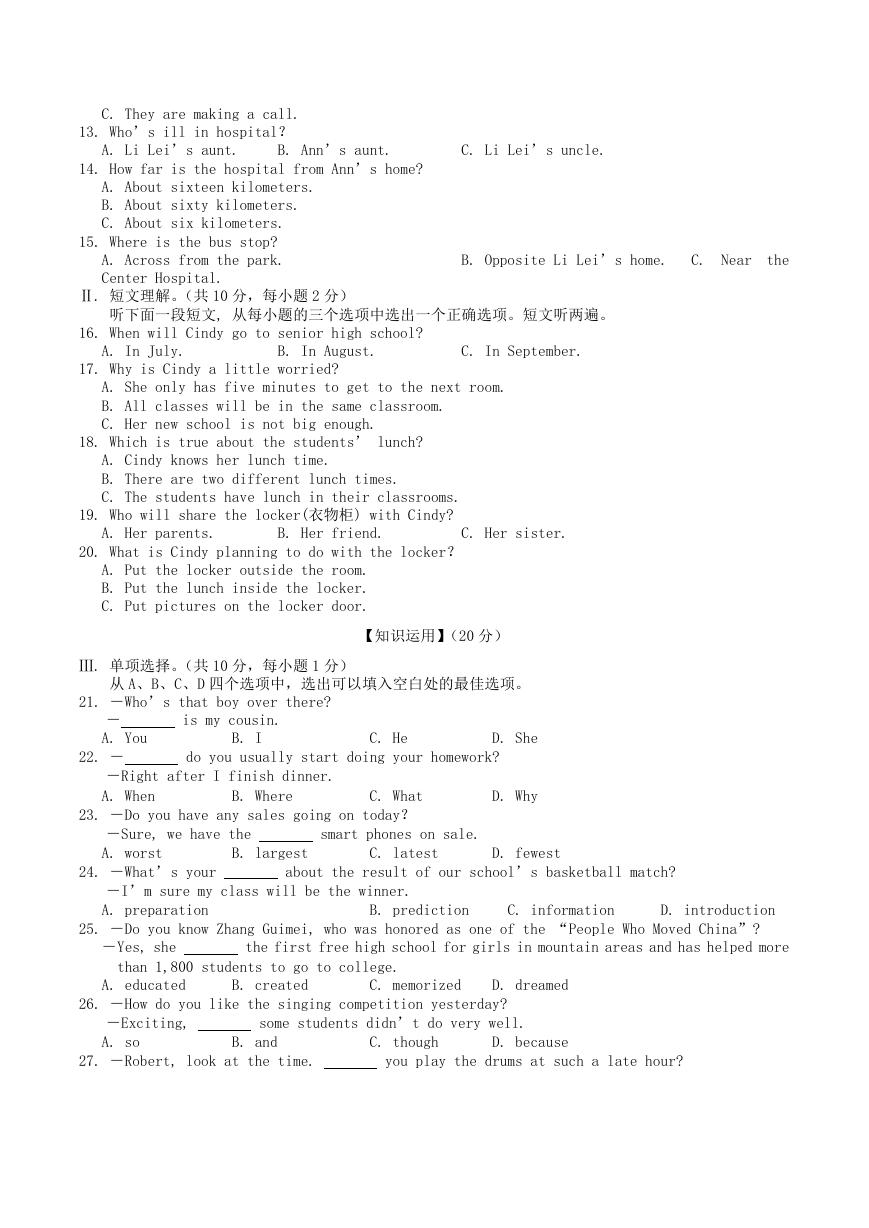
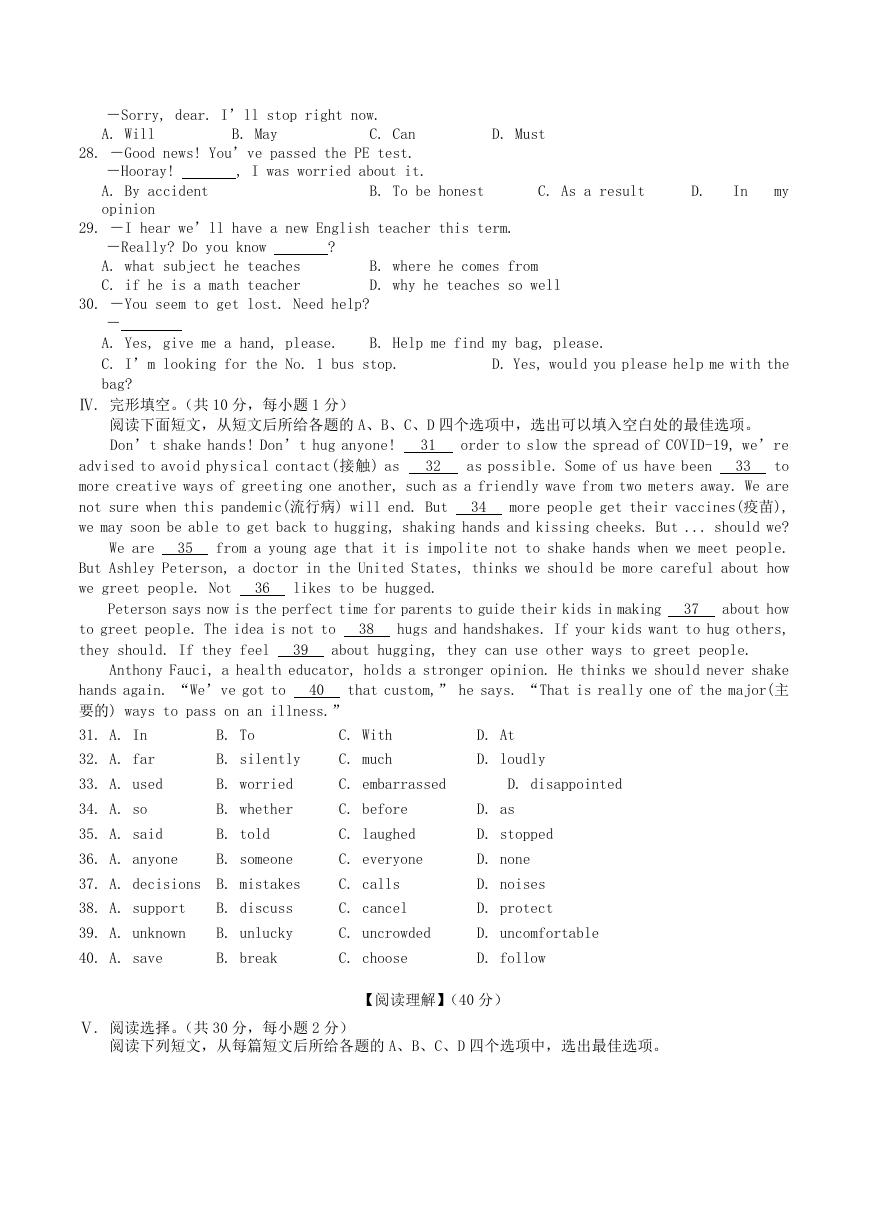
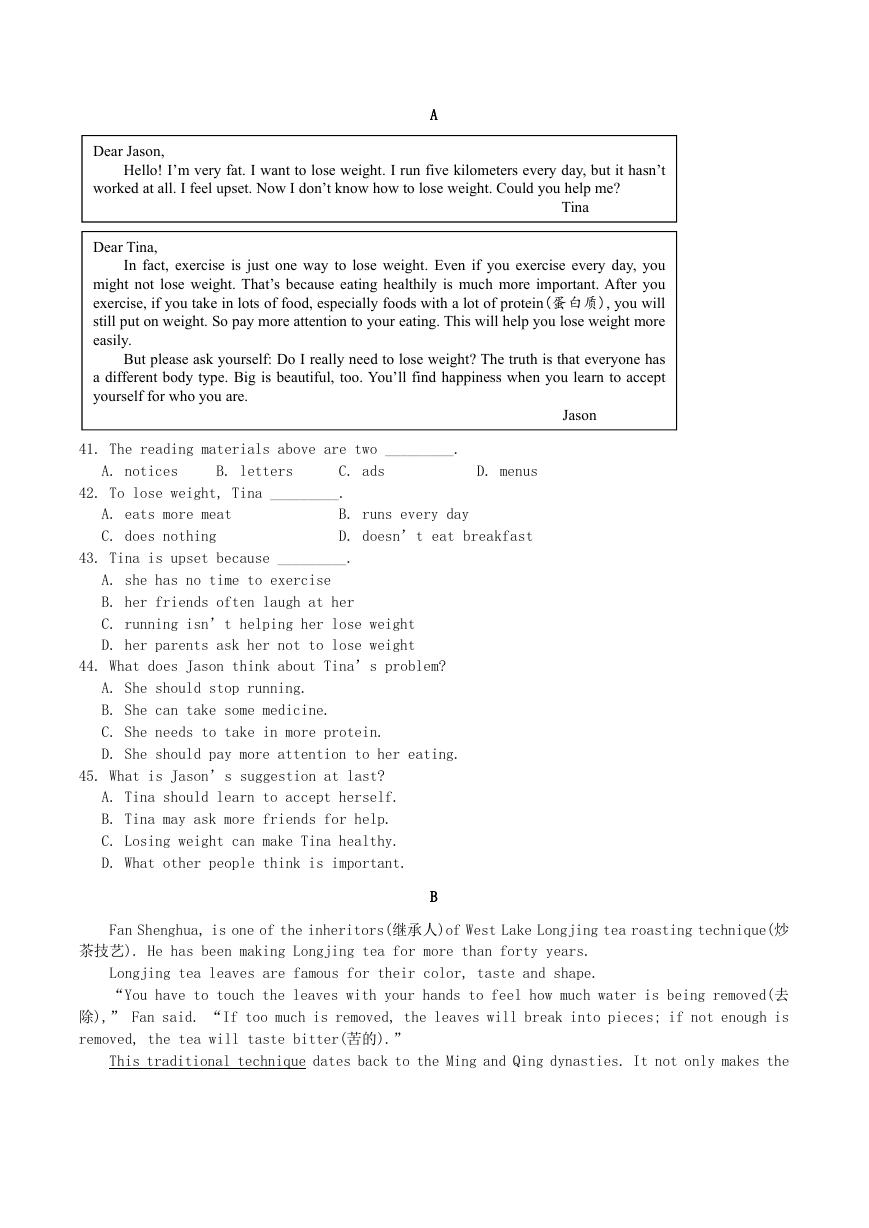
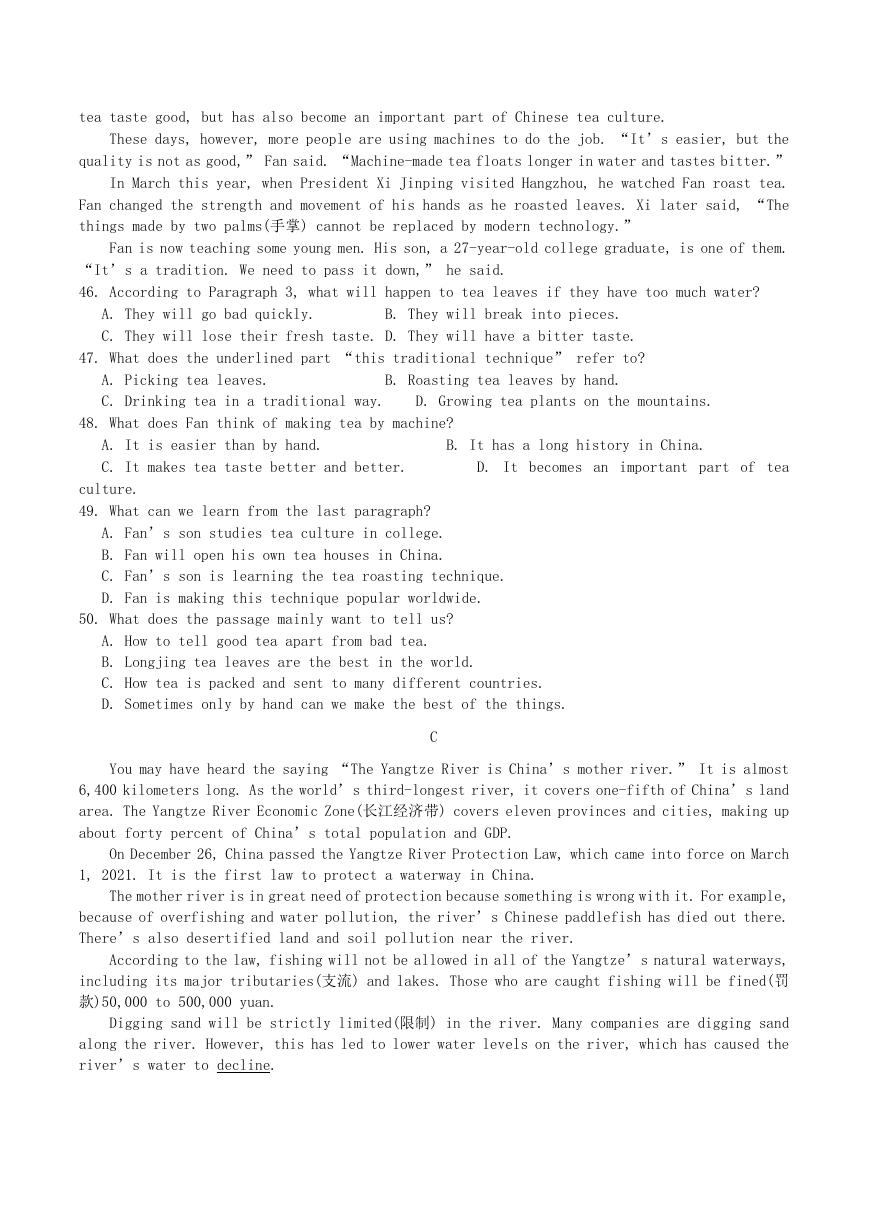
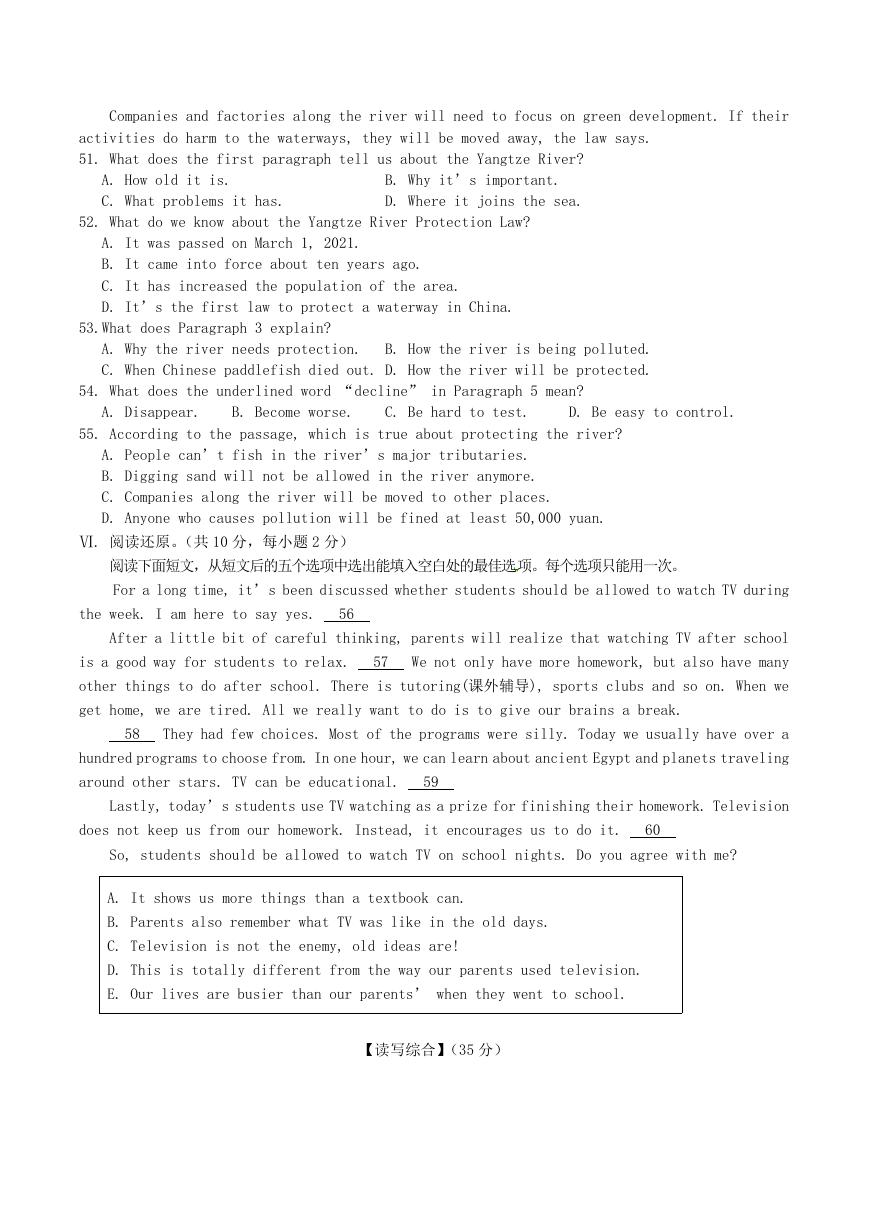
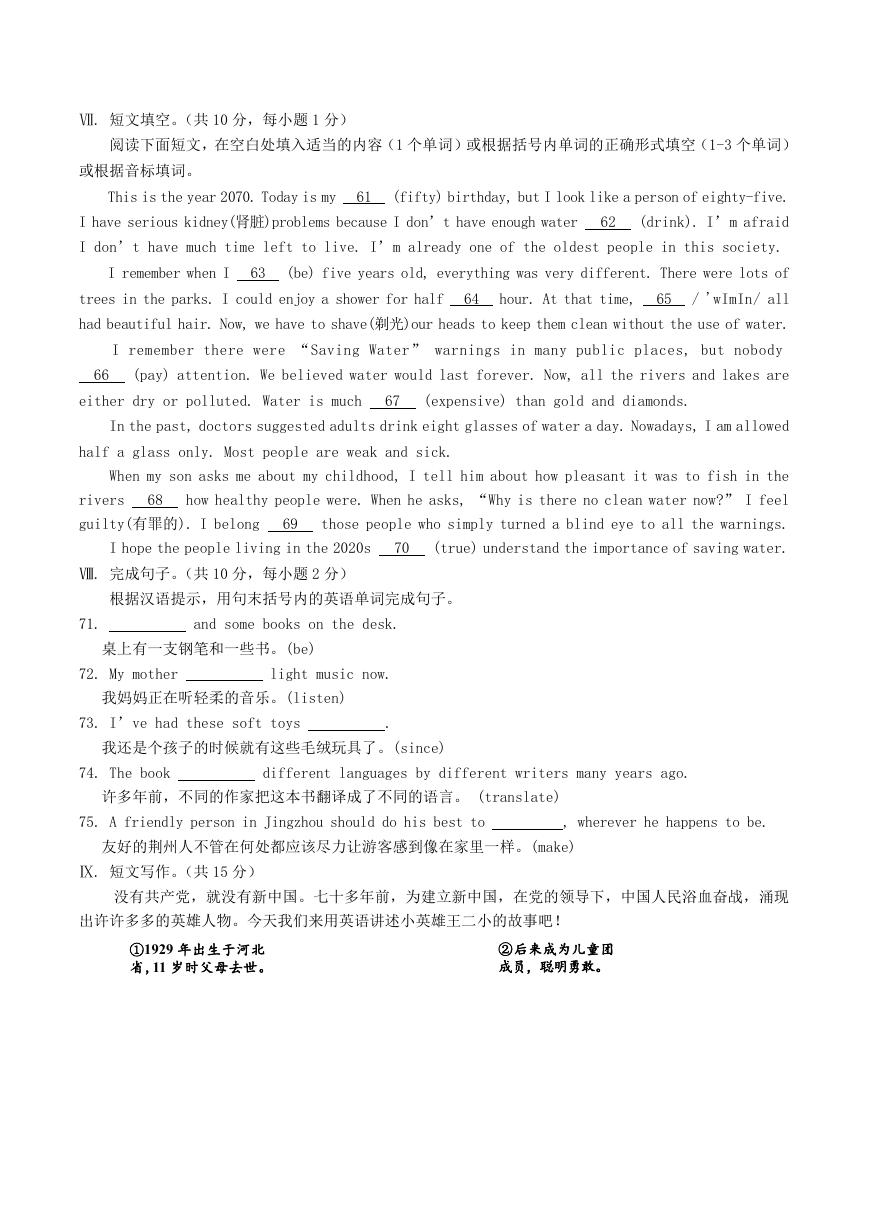
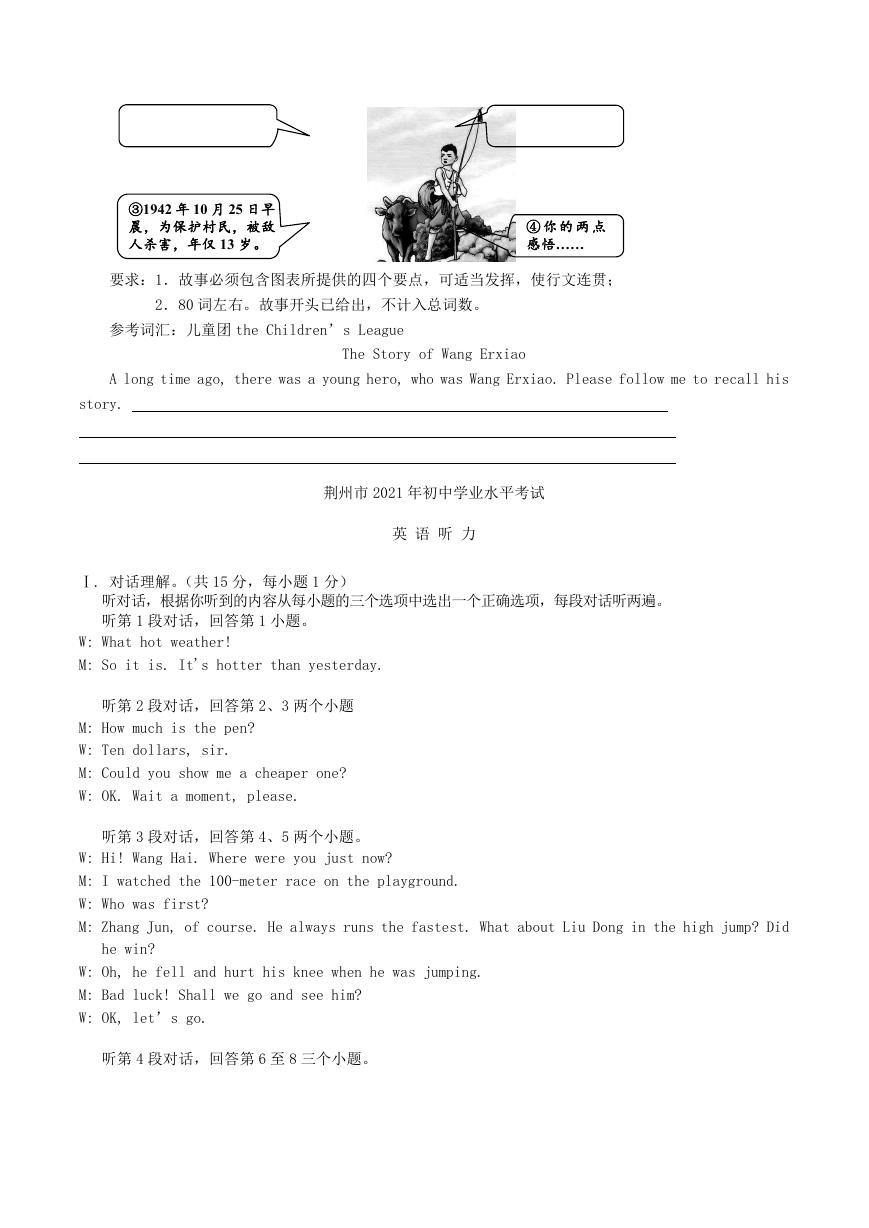








 2023年江西萍乡中考道德与法治真题及答案.doc
2023年江西萍乡中考道德与法治真题及答案.doc 2012年重庆南川中考生物真题及答案.doc
2012年重庆南川中考生物真题及答案.doc 2013年江西师范大学地理学综合及文艺理论基础考研真题.doc
2013年江西师范大学地理学综合及文艺理论基础考研真题.doc 2020年四川甘孜小升初语文真题及答案I卷.doc
2020年四川甘孜小升初语文真题及答案I卷.doc 2020年注册岩土工程师专业基础考试真题及答案.doc
2020年注册岩土工程师专业基础考试真题及答案.doc 2023-2024学年福建省厦门市九年级上学期数学月考试题及答案.doc
2023-2024学年福建省厦门市九年级上学期数学月考试题及答案.doc 2021-2022学年辽宁省沈阳市大东区九年级上学期语文期末试题及答案.doc
2021-2022学年辽宁省沈阳市大东区九年级上学期语文期末试题及答案.doc 2022-2023学年北京东城区初三第一学期物理期末试卷及答案.doc
2022-2023学年北京东城区初三第一学期物理期末试卷及答案.doc 2018上半年江西教师资格初中地理学科知识与教学能力真题及答案.doc
2018上半年江西教师资格初中地理学科知识与教学能力真题及答案.doc 2012年河北国家公务员申论考试真题及答案-省级.doc
2012年河北国家公务员申论考试真题及答案-省级.doc 2020-2021学年江苏省扬州市江都区邵樊片九年级上学期数学第一次质量检测试题及答案.doc
2020-2021学年江苏省扬州市江都区邵樊片九年级上学期数学第一次质量检测试题及答案.doc 2022下半年黑龙江教师资格证中学综合素质真题及答案.doc
2022下半年黑龙江教师资格证中学综合素质真题及答案.doc